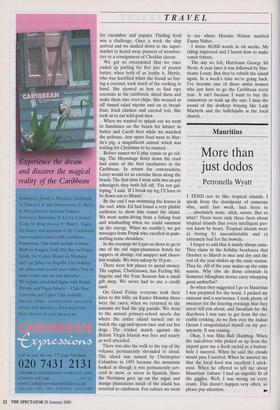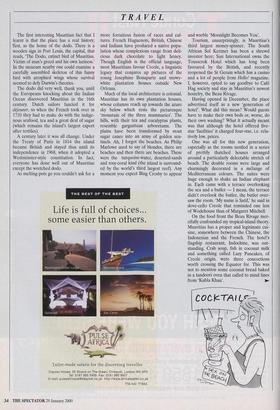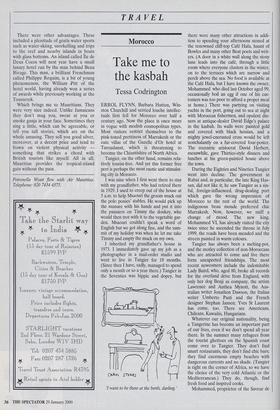Mauritius
More than just dodos
Petronella Wyatt
I TEND not to like tropical islands. I speak from the standpoint of someone who, until last week, had been to . . . absolutely none, zilch, niente. But so what? There were only three facts about tropical islands that every intelligent per- son knew by heart. Tropical islands were a) boring b) uncomfortable and c) extremely bad for the bowels.
I forgot to add that it nearly always rains. They claim in the holiday brochures that October to March is nice and dry and the rest of the year makes up the rainy season. They lie. All of the year makes up the rainy season. Why else do those colonials in Somerset Maugham stories carry whopping great umbrellas?
So when they suggested I go to Mauritius I was prepared for the worst. I packed my raincoat and a sou'wester. I took plenty of sweaters for the freezing evenings that they never tell you about, and Imodium for the diarrhoea I was sure to get from the exe- crable cooking. As we flew over the Indian Ocean I congratulated myself on my per- spicacity. It was raining.
Okay, I was Miss Bah Humbug. When the taxi-driver who picked us up from the airport gave me a fresh orchid as a button- hole I sneered. When he said the clouds would pass I snorted. When he assured me that the local food was excellent I snick- ered. When he offered to tell me about Mauritian 'culture' I had an impolite fit of the giggles. Well, I was wrong on every count. This doesn't happen very often, so please pay attention. lb- The first interesting Mauritian fact that I learnt is that the place has a real history; 'first, as the home of the dodo. There is a wooden sign in Port Louis, the capital, that reads, The Dodo, extinct bird of Mauritius. Victim of man's greed and his own laziness.' In the museum nearby one could examine a carefully assembled skeleton of this funny bird with atrophied wings whose survival seemed to defy Darwin's theories.
The dodo did very well, thank you, until the Europeans knocking about the Indian Ocean discovered Mauritius in the 16th century. Dutch sailors fancied it for defeuner, so when the French took over in 1710 they had to make do with the indige- nous seafood, tea and a great deal of sugar (which remains the island's largest export after textiles).
A century later it was all change. Under the Treaty of Paris in 1814 the island became British and stayed thus until its independence in 1968, when it adopted a Westminster-style constitution. In fact, everyone has done well out of Mauritius except the wretched dodo.
As melting-pots go you couldn't ask for a more fortuitous fusion of races and cul- tures. French Huguenots, British, Chinese and Indians have produced a native popu- lation whose complexions range from deli- cious dark chocolate to light honey. Though English is the official language, most Mauritians favour Creole, a linguistic legacy that conjures up pictures of the young Josephine Bonaparte and snowy- white plantation houses outside New Orleans.
Much of the local architecture is colonial. Mauritius has its own plantation houses, whose columns reach up towards the azure sky below which rests the picturesque 'mountain of the three mammaries'. The hills, with their tea and eucalyptus plants, resemble gargantuan arboretums. The plains have been transformed by stout sugar canes into an army of golden sen- tinels. Ah, I forgot the beaches. As Philip Marlowe used to say of blondes, there are beaches and then there are beaches. These were the turquoise-water, deserted-sands and rosy-coral kind (the island is surround- ed by the world's third largest reef). Any moment you expect Bing Crosby to appear and warble 'Moonlight Becomes You'.
Tourism, unsurprisingly, is Mauritius's third largest money-spinner. The South African Sol Kerzner has been a shrewd investor here; Sun International owns the Tousserok Hotel which has long been favoured by the British, and recently reopened the St Gerain which has a casino and a lot of people from Hello! magazine. I, however, opted to say goodbye to Café Hag society and stay in Mauritius's newest hostelry, the Beau Rivage.
Having opened in December, the place advertised itself as a new 'generation of hotel'. What did this mean? Would guests have to make their own beds or, worse, do their own washing? What it actually meant was that although the hotel offered five- star 'facilities' it charged four-star, i.e. rela- tively low, prices.
One was all for this new generation, especially as the rooms nestled in a series of prettily thatched houses arranged around a particularly delectable stretch of beach. The double rooms were large and charmingly decorated in a mélange of Mediterranean colours. The suites were huge enough to shake an Indian elephant in. E4ch came with a terrace overlooking the sea and a butler — I mean, the terrace didn't overlook the butler, the butler over- saw the room. 'My name is Satif,' he said in dove-cello Creole that reminded one less of Wodehouse than of Margaret Mitchell.
On the food front the Beau Rivage mer- cifully confounded my tropical-island theory. Mauritius has a proper and legitimate cui- sine, somewhere between the Chinese, the Indonesian and the French. The hotel's flagship restaurant, Indochine, was out- standing. Crab soup, fish in coconut milk and something called Lazy Pancakes, of Creole origin, were three concoctions worth crossing the Equator for. This was not to mention some coconut bread baked in a tandoori oven that called to mind lines from `Kubla Khan'. Do- There were other advantages. These included a plenitude of gratis water sports such as water-skiing, snorkelling and trips to the reef and nearby islands in boats with glass bottoms. An island called Ile de Deux Cocos will next year have a small luxury hotel run by the man behind Beau Rivage. This man, a brilliant Frenchman called Philippe Requim, is a bit of young phenomenon, the William -Pitt of the hotel world, having already won a series of awards while previously working at the Tousserpk.
Which brings me to Mauritians. They were very nice indeed. Unlike Jamaicans they don't mug you, swear at you or smoke ganja in your face. Sometimes they sing a little, which can be agreeable, or tell you tall stories, which are on the whole amusing. They sell you good silver, moreover, at a decent price and tend to frown on violent physical activity — something that strikes a chord with British tourists like myself. All in all, Mauritius provides the tropical-island gain without the pain.
Petronella Wyatt flew with Air Mauritius. Telephone: 020 7434 4375.




















































































 Previous page
Previous page